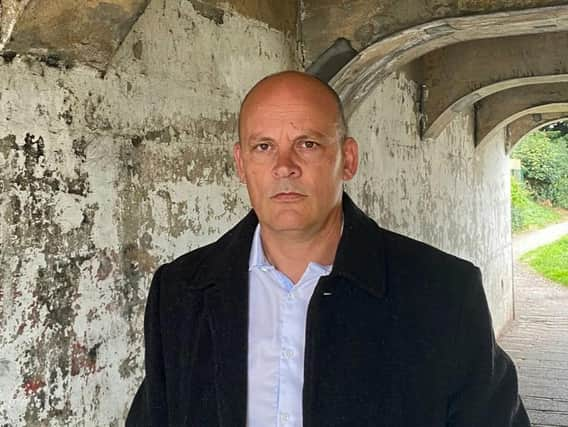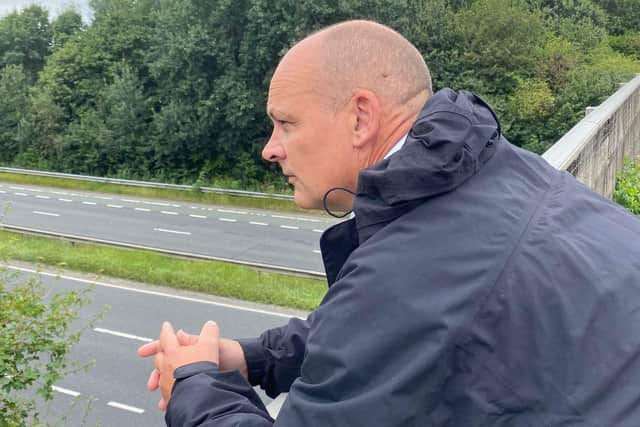Ex-Wigan police chief puts hostage negotiation skills to good use for businesses


Nigel Taberner successfully oversaw over 130 high-risk armed sieges, suicide threats and international negotiations during a 30-year career with Greater Manchester Police and Counter-Terrorism Policing North West.
The 52-year-old launched Level2Communications after retiring from the police in February and has already spoken to a series of blue chip companies and football clubs about how to communicate more effectively.
Advertisement
Hide AdAdvertisement
Hide AdMr Taberner, who was born and raised in Wigan and now lives in Chester, said: “Thankfully very few people will be faced with a situation where a man is holding a gun to their partner’s head and threatening to pull the trigger or someone is standing on a bridge about to jump.


“That was part of my life as a hostage negotiator for 10 years and I feel very lucky that nobody died during the 130-plus incidents I had to deal with.
“However the skills you learn as a hostage negotiator around making a good impression, building trust, listening and performing under pressure, are transferrable into the world of business and enable leaders to create better outcomes. That’s why I started Level2Communications.”
Mr Taberner rose to the rank of detective inspector for counter-terrorism policing operations at Manchester Airport and Liverpool John Lennon Airport during his police career and combined it with volunteering as a highly-trained hostage negotiator.
Advertisement
Hide AdAdvertisement
Hide AdHe recalled: “I went to school at Deanery High School in Wigan and did an apprenticeship in vehicle bodybuilding at Northern Counties Motor & Engineering Company but I only ever wanted to be a cop.
“I joined the police when I was 21 to fight crime and protect vulnerable people. In my first week of training we were spoken to by a negotiator and it inspired me. It ticked all the boxes about why I wanted to be a policeman.
“You need to be a certain rank to be a negotiator so I threw myself into my career for the next 20 years and when the opportunity came up in 2011 to be a hostage negotiator I volunteered.”
After undergoing his training his first call-out came two weeks later to reports of a domestic armed siege in Stockport.
Advertisement
Hide AdAdvertisement
Hide Ad“I was told a gunman had barricaded himself into a house with a nine-month-old child and had doused the place in petrol,” he recalled.
“I was the lead negotiator and privately I was terrified. I was in the garden, standing behind a ballistic shield, looking up at a bedroom window where a highly agitated man was waving a gun around and pouring liquid on himself that he said was petrol.
“My first words weren’t ‘put down the gun’ which you see in the films but rather to use his first name and say ‘I can’t possibly imagine how scary it must be for you right now’ because the aim is to start a conversation.”
His first hostage situation ended peacefully after nine hours. It later turned out the man didn’t have a child hostage and the gun was a replica. The suspected petrol turned out to be water.
Advertisement
Hide AdAdvertisement
Hide Ad“I was both exhausted and elated that the situation had ended without injury,” said Mr Taberner. “That was the beginning of my 10 years as a hostage negotiator.
“Around 80 per cent of my negotiations were to suicide interventions, which could be at a bridge, high rise flat or multi-storey car park.
“When I was in that situation I always said something like ‘my name is Nige, I’m here with the police. I can’t imagine what has happened to make you come up here so why don’t you tell me?”
Mr Taberner identified listening as the key ingredient to being a negotiator.
Advertisement
Hide AdAdvertisement
Hide Ad“The best leaders are normally the best listeners,” he said. “That’s where the name of the business came from. Level 1 listening refers to general chit chat but listening at level 2 is listening at elite level. That’s what I teach.
“Whether you’re the CEO of a business or a negotiator at an armed siege, the starting point is listening. Creating a good first impression is also really important.
“As a negotiator I wanted the other person to like me in order to develop trust and confidence. If you lose that trust you’re burnt but if you have that trust you can try and persuade them into a particular course of action.”
Mr Taberner has delivered training courses to police officers in the UK, Finland, Australia and the FBI and is now focusing his attention on helping businesses.
Advertisement
Hide AdAdvertisement
Hide Ad“The original plan for Level2Communications was to offer half-day communication courses for businesses but I’ve had to switch my sessions online because of Covid,” he said. “Whether you’re the managing director of a FTSE company or a football manager you need good communication skills to drive better performance. That’s what I try to teach people.”
Thanks for reading. If you value what we do and are able to support us, a digital subscription is just £1 for your first month. Try us today by clicking here and viewing our offers.